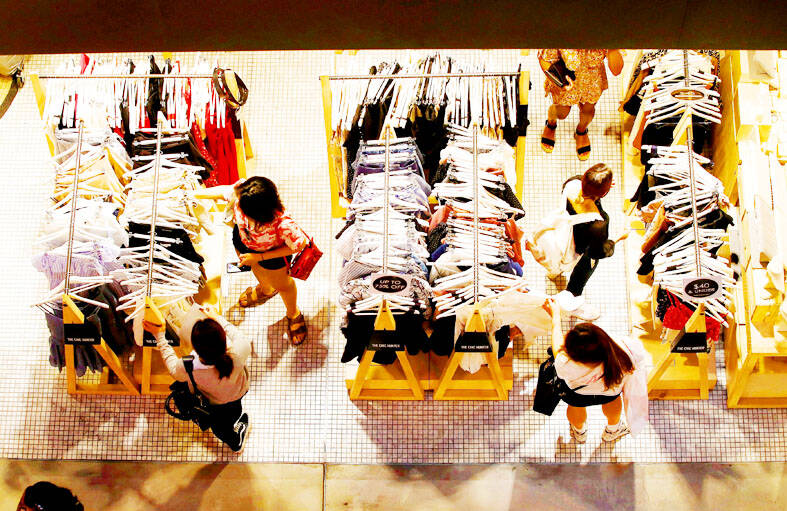Australia’s consumer confidence surged and business sentiment showed ongoing resilience after the Reserve Bank of Australia (RBA) left its key interest rate unchanged for the first time in its almost yearlong tightening cycle.
Consumer sentiment rose 9.4 percent this month to 85.8, a Westpac Banking Corp survey showed yesterday.
Still Westpac chief economist Bill Evans said he expects household spending this year to be lackluster with confidence remaining 10.4 percent below the level in April last year, the month before the RBA began raising rates.

Photo: Reuters
A separate National Australia Bank Ltd survey released an hour later yesterday showed that business conditions eased to 16 points last month, remaining well above long-run average.
Confidence advanced three points to minus-1.
“The survey suggests the economy is still holding up and indicates there has been some easing in inflation,” National Australia Bank chief economist Alan Oster said. “There is still a long way to go to bring inflation back down to the RBA’s target band and growth could be more volatile from there.”
RBA policymakers paused their tightening cycle last week as they attempt to engineer a soft landing in the economy while bringing down inflation.
The central bank has raised rates 3.5 percentage points since May last year to 3.6 percent and this month signaled the hurdle to further tightening is elevated.
The RBA’s inflation target is 2 to 3 percent and the most recent monthly reading came in at 6.8 percent.
RBA Governor Philip Lowe has said the board would closely monitor data on inflation, jobs, consumer spending and business surveys before making a decision on further increases.
“With underlying inflation still likely to be in the 6.5 to 7.0 percent range and the unemployment rate holding around fifty-year lows the case for extending the pause in May is likely to be challenged,” Evans said.
“The board’s decision will be to weigh the ‘here and now’ evidence against its two-year forecast,” he added.

Taiwan Semiconductor Manufacturing Co (TSMC, 台積電) yesterday said that its investment plan in Arizona is going according to schedule, following a local media report claiming that the company is planning to break ground on its third wafer fab in the US in June. In a statement, TSMC said it does not comment on market speculation, but that its investments in Arizona are proceeding well. TSMC is investing more than US$65 billion in Arizona to build three advanced wafer fabs. The first one has started production using the 4-nanometer (nm) process, while the second one would start mass production using the

‘SILVER LINING’: Although the news caused TSMC to fall on the local market, an analyst said that as tariffs are not set to go into effect until April, there is still time for negotiations US President Donald Trump on Tuesday said that he would likely impose tariffs on semiconductor, automobile and pharmaceutical imports of about 25 percent, with an announcement coming as soon as April 2 in a move that would represent a dramatic widening of the US leader’s trade war. “I probably will tell you that on April 2, but it’ll be in the neighborhood of 25 percent,” Trump told reporters at his Mar-a-Lago club when asked about his plan for auto tariffs. Asked about similar levies on pharmaceutical drugs and semiconductors, the president said that “it’ll be 25 percent and higher, and it’ll

When an apartment comes up for rent in Germany’s big cities, hundreds of prospective tenants often queue down the street to view it, but the acute shortage of affordable housing is getting scant attention ahead of today’s snap general election. “Housing is one of the main problems for people, but nobody talks about it, nobody takes it seriously,” said Andreas Ibel, president of Build Europe, an association representing housing developers. Migration and the sluggish economy top the list of voters’ concerns, but analysts say housing policy fails to break through as returns on investment take time to register, making the

CHIP BOOM: Revenue for the semiconductor industry is set to reach US$1 trillion by 2032, opening up opportunities for the chip pacakging and testing company, it said ASE Technology Holding Co (日月光投控), the world’s largest provider of outsourced semiconductor assembly and test (OSAT) services, yesterday launched a new advanced manufacturing facility in Penang, Malaysia, aiming to meet growing demand for emerging technologies such as generative artificial intelligence (AI) applications. The US$300 million facility is a critical step in expanding ASE’s global footprint, offering an alternative for customers from the US, Europe, Japan, South Korea and China to assemble and test chips outside of Taiwan amid efforts to diversify supply chains. The plant, the company’s fifth in Malaysia, is part of a strategic expansion plan that would more than triple